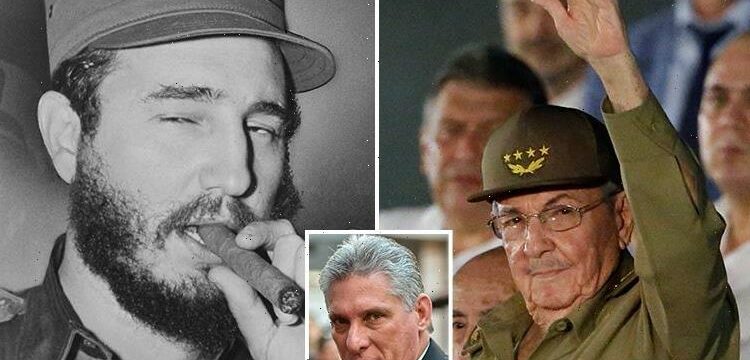ONE of communism’s longest surviving dynasties has come to an end after Cuba's vice-president takes control from Raul Castro.
Raul, who took over from his brother Fidel 12 years ago formally stepped down today and handed power to someone outside the family for the first time since the revolution propelled them power more than half a century ago.
First Vice President Miguel Mario Diaz-Canel Bermudez was the sole candidate to succeed Raul in a transition aimed at ensuring that the country's single-party system outlasts the ageing revolutionaries who created it.
But the change is not expected to herald sweeping reforms to the island’s state-run economy and one-party system, one of the last communist regimes in the world.
And some in Cuba wonder whether Raul will pull the new leaders strings from behind the scenes?
The new national leadership is expected to be officially announced on the anniversary of the defeat of US-backed invaders at the Bay of Pigs in 1961 which aimed to topple the Fidel Castro.
Since seizing power in 1959, the Castros have overseen both revolution and modernisation of the island while becoming some of the most divisive figures in the world.
Fidel was a son of a wealthy sugarcane farmer and was a originally a lawyer.
But his passion for politics and socialism inspired him to overthrow a dictator Fulgencio Batista in 1952 with his brother Raul.
But an attempt to take over a military garrison failed and he was jailed.
When he was released two years later he went to Mexico with Raul and met up with famed revolutionary Ché Guevara.
Fidel then returned to Cuba and successfully led an uprising against Bastia.
Cuba was then transformed into a communist state and the free press and elections were banned. Human rights abuses have characterised the regime.
Fidel first shot to world fame when the US caught the USSR shipping nuclear missiles to the island which put the entire United States within easy range.
World War 3 was narrowly avoided after a tense two week stand-off between President John F Kennedy and the Soviet leader Nikita Khrushchev.
It was arguably the closest time the world came to nuclear apocalypse during the Cold War and collective sense of relief world-wide was said to be palpable when the dispute was resolved and the missiles taken back to the Soviet Union.
A long lasting trade embargo followed and the economy became stagnant.
Any descent over this was crushed, causing many fed-up or persecuted citizens to flee by boat to Florida.
When the USSR collapsed in 1991 the Castro regime lost its biggest financial backer but the brothers managed to cling to power by reforms that allowed families to form businesses.
They even developed a tourist industry with people attracted by cheap flights, its reconditioned 1950s cars or simply curious to visit a real-life communist state.
MOST READ IN NEWS
FACE-OFF Seven bizarre claims in Andrew's defence that spark more questions than answers
Horrors of ‘world's most feral kids’ from real-life Mowgli to kid raised in coop
Andrew 'on collision course with Palace' as he demands jury for lawsuit
Kiev mayor & boxing champ Klitschko slams Germany’s ‘joke’ offer of HELMETS
But in the last few years of his life, Fidel, having already become the world’s longest serving leader, became too frail .
So he stepped down and handed power to Raul – a much less bombastic figure than his brother who died in 2016 at the ripe old age of 90, despite his fondness for cigar smoking.
But Raul too has become too frail as he enters his 86th year and with no one lined up the dynasty has come to an end, leaving North Korea’s Kim family the sole community family in the world.
Dr Stephanie Panichelli-Batalla, a Global Sustainable Development professor at the University of Warwick, told Sun Online: “Today is an important day for Cuba, as for the first time in sixty years, Cuba’s leader will not be a Castro nor will he have fought in the Cuban Revolution in the fifties.
“The selection of Diaz Canel however is no surprise, and the fact that he was the sole candidate selected and presented to the assembly shows that little is changing in Cuba.
“Cuban people themselves do not have much expectations that major changes are on the way, some even compare him to Oswaldo Dorticos, president of Cuba between 1959 and 1976, who has been referred to as a 'puppet president', while Fidel Castro was behind every decision taken at that time.
“Of course no one can predict the future, and only time will tell what Diaz Canel will do once in government.”
Source: Read Full Article














